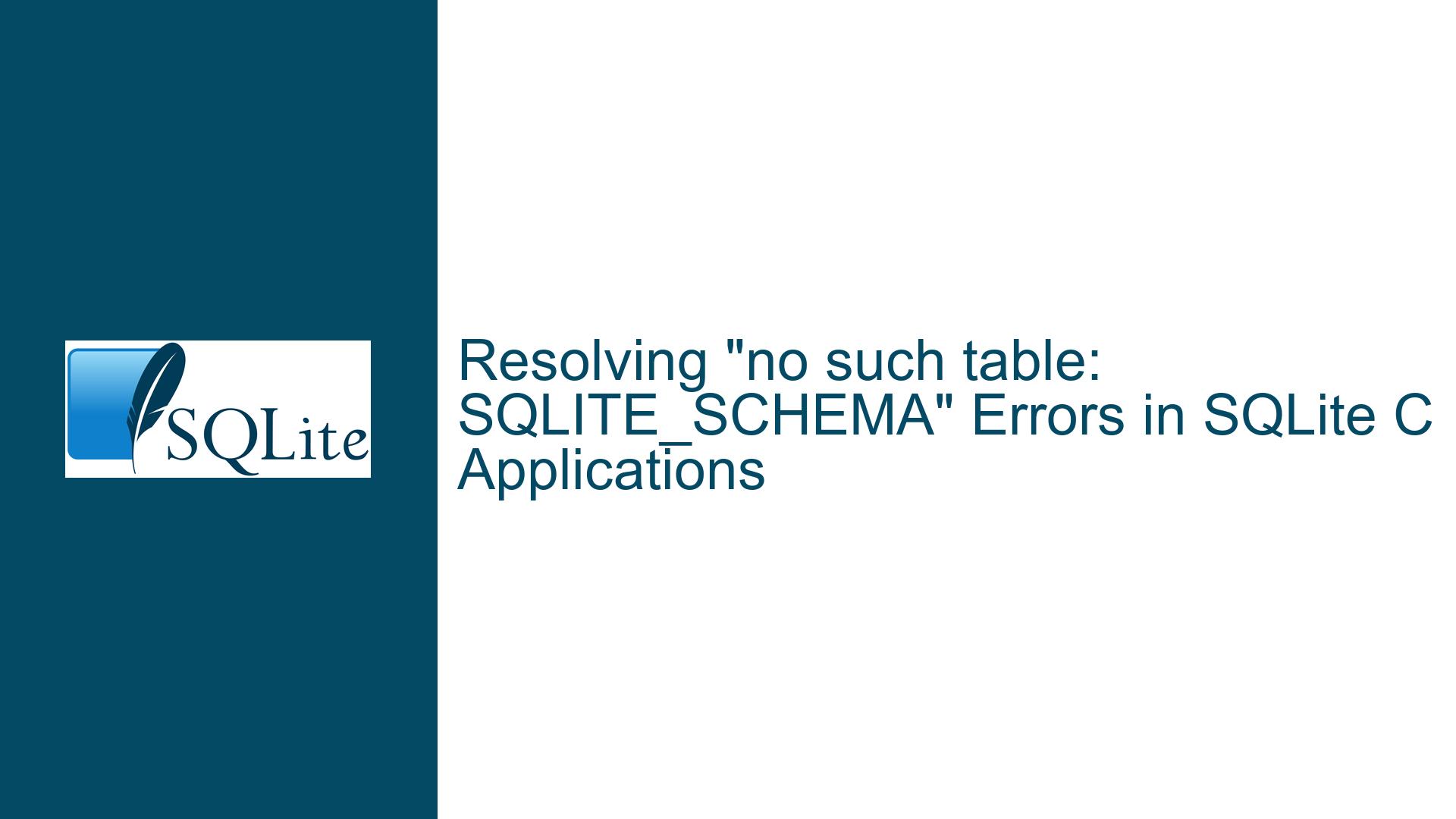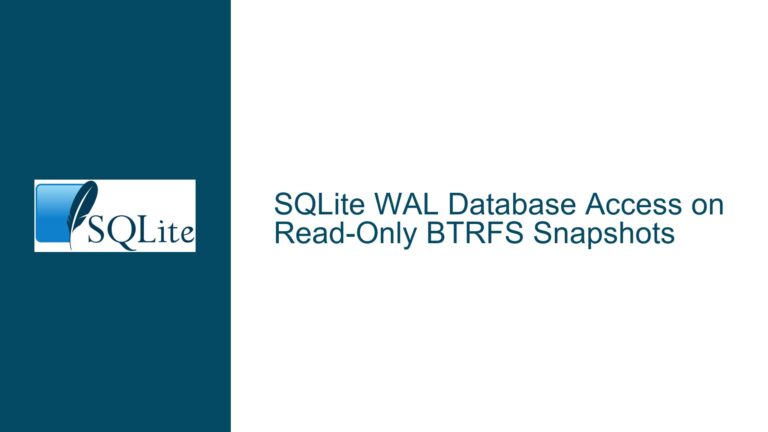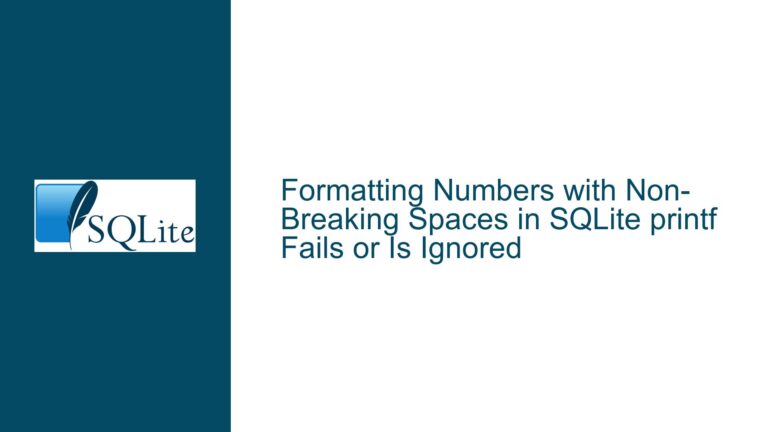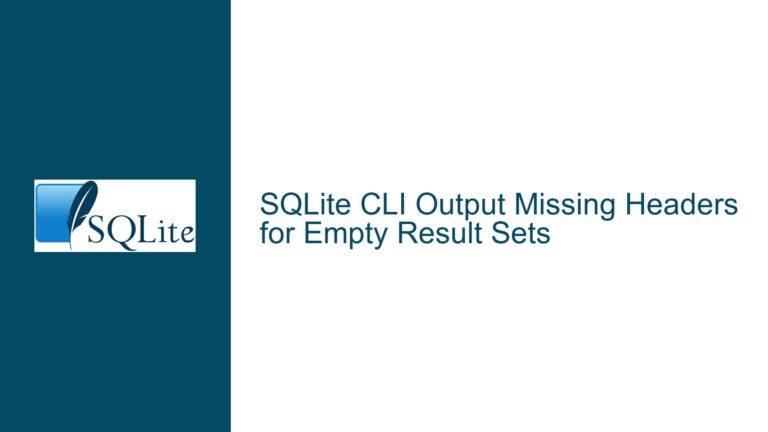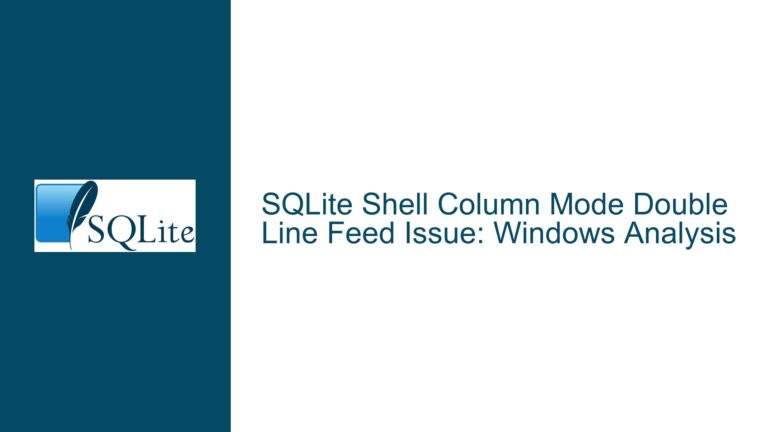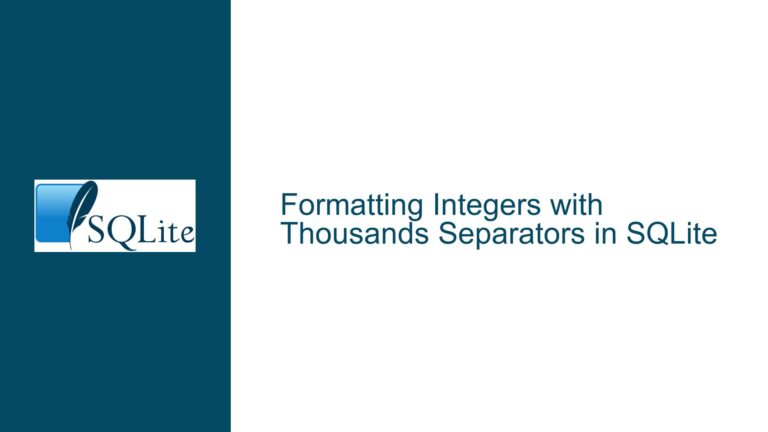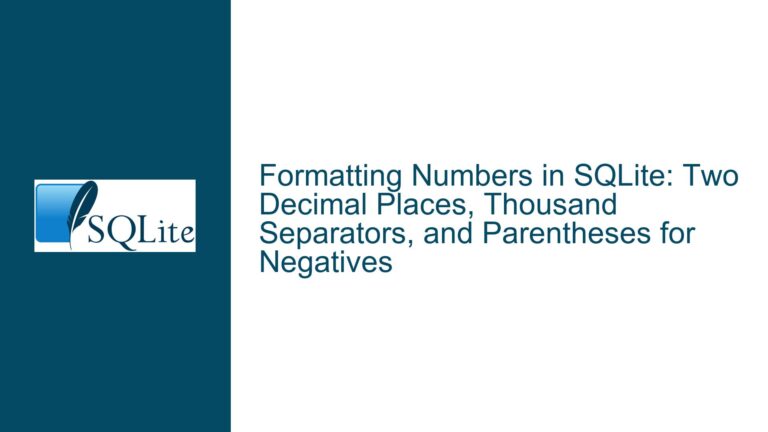Resolving “no such table: SQLITE_SCHEMA” Errors in SQLite C Applications
Understanding the SQLITE_SCHEMA Table Reference Mismatch in C Applications
Root Cause Analysis: Version-Dependent Schema Table Aliases
The core issue arises from the use of SQLITE_SCHEMA as a table name in a C application linked against an older SQLite library version. SQLite historically used sqlite_master as the internal schema table, with SQLITE_SCHEMA introduced as a case-insensitive alias in version 3.33.0 (2020-08-14). Applications using older SQLite libraries (pre-3.33.0) will fail to recognize SQLITE_SCHEMA as a valid table reference, while newer CLI tools or applications built with updated libraries will accept both forms. This version disparity explains why the same query succeeds in the sqlite3 command-line interface (CLI) but fails in a C application using an outdated dynamic library.
The CLI often ships as a statically linked binary containing the latest SQLite version, whereas C applications may dynamically link against system-wide libraries that lag behind. The error no such table: SQLITE_SCHEMA directly stems from this version mismatch: the application’s SQLite engine lacks support for the SQLITE_SCHEMA alias, treating it as a literal table name rather than a reference to the schema metadata store.
Critical Factors Contributing to Schema Table Resolution Failures
Legacy SQLite Library Dependencies:
Systems using shared library packages (e.g.,libsqlite3-0on Debian/Ubuntu) often prioritize stability over new features. Distribution-maintained libraries may be several versions behind the latest SQLite release, lacking support for newer aliases likeSQLITE_SCHEMA. Applications relying on these shared libraries inherit their limitations.Static vs. Dynamic Linking Characteristics:
The SQLite CLI is frequently compiled as a standalone executable with the SQLite amalgamation source embedded. This static linking ensures the CLI uses the exact version of SQLite packaged with it, decoupled from system libraries. Conversely, dynamically linked C applications bind to whicheverlibsqlite3version resides on the system, creating version skew if the CLI and application use different linkage methods.Case Sensitivity and Schema Table Aliasing Rules:
SQLite’s schema table naming conventions exhibit case insensitivity in practice, but this is context-dependent. Whilesqlite_masteris the canonical name, aliases likeSQLITE_MASTER(all caps) orSQLITE_SCHEMAare permitted in later versions. The application’s SQL parser resolves these names based on (a) the library’s version and (b) the compilation flags used (e.g.,-DSQLITE_ENABLE_DBSTAT_VTAB). Older parsers strictly requiresqlite_masterwithout recognizing newer aliases.Documentation vs. Implementation Timelines:
SQLite’s official documentation updates immediately upon new releases, but developers referencing these docs may overlook the actual library version their code uses. The FAQ entry describingSQLITE_SCHEMAassumes a recent enough library version, creating a pitfall for projects tied to older dependencies.
Comprehensive Remediation Strategies for Schema Table Access
Step 1: Validate the Linked SQLite Library Version
Embed a version check within the application to confirm the linked SQLite library’s age:
printf("SQLite Library Version: %s\n", sqlite3_libversion());
If this reports a version below 3.33.0, SQLITE_SCHEMA will not be recognized. Cross-validate against the CLI’s version using sqlite3 --version.
Step 2: Standardize on sqlite_master for Backward Compatibility
Replace all instances of SQLITE_SCHEMA with sqlite_master in SQL queries. This ensures compatibility across all SQLite versions, as sqlite_master is universally recognized:
char* pSql = "SELECT name FROM sqlite_master;";
Step 3: Update or Rebuild the SQLite Dependency
If the application requires features from newer SQLite versions, upgrade the system’s shared library or statically link against a current amalgamation:
- Linux (Debian/Ubuntu):
sudo apt-get update && sudo apt-get install libsqlite3-dev - Static Linking:
Download the latest amalgamation source from SQLite Download Page, compile it into the application:gcc -I. -DSQLITE_ENABLE_JSON1 -DSQLITE_ENABLE_FTS5 your_app.c sqlite3.c -ldl -lpthread -o your_app
Step 4: Enforce Symbolic Links to Correct Library Versions
On systems where multiple SQLite versions coexist, ensure the application’s build process references the intended library path. Use ldd to verify linkage:
ldd your_app | grep sqlite3
If the output points to an outdated library, adjust linker flags during compilation:
gcc your_app.c -o your_app -L/path/to/newer/lib -lsqlite3 -Wl,-rpath=/path/to/newer/lib
Step 5: Implement Conditional Compilation for Version-Specific Features
For codebases targeting multiple SQLite versions, use preprocessor directives to toggle between sqlite_master and SQLITE_SCHEMA:
#if SQLITE_VERSION_NUMBER >= 3033000
#define SCHEMA_TABLE "SQLITE_SCHEMA"
#else
#define SCHEMA_TABLE "sqlite_master"
#endif
char* pSql = "SELECT name FROM " SCHEMA_TABLE ";";
Step 6: Audit System-Wide Library Conflicts
Development environments often harbor multiple SQLite installations (e.g., OS-provided libsqlite3, manually installed versions in /usr/local/lib). Resolve conflicts using:
sudo update-alternatives --config libsqlite3
Or explicitly specify the library path during compilation.
Step 7: Utilize Prepared Statements for Enhanced Error Diagnostics
Replace sqlite3_exec() with prepared statements to capture precise error contexts:
sqlite3_stmt *stmt;
const char *tail;
int rc = sqlite3_prepare_v2(pDB, "SELECT name FROM SQLITE_SCHEMA", -1, &stmt, &tail);
if (rc != SQLITE_OK) {
fprintf(stderr, "Prepare failed: %s\n", sqlite3_errmsg(pDB));
}
while ((rc = sqlite3_step(stmt)) == SQLITE_ROW) {
printf("%s\n", sqlite3_column_text(stmt, 0));
}
sqlite3_finalize(stmt);
This approach often yields more detailed error messages compared to sqlite3_exec().
Step 8: Cross-Compilation Considerations for Embedded Targets
When deploying to ARM platforms or embedded systems, ensure the cross-compilation toolchain references the correct SQLite headers and libraries. Mismatches here can reintroduce version discrepancies:
arm-linux-gnueabihf-gcc -I/opt/sqlite/include your_app.c -L/opt/sqlite/lib -lsqlite3 -o arm_app
Step 9: Monitor SQLite’s Release Notes for Deprecations
Subscribe to SQLite’s changelog to anticipate future breaks. Proactively update schema queries when deprecated features are scheduled for removal.
Step 10: Leverage the PRAGMA database_list for Schema Validation
As a diagnostic aid, query database attachments to confirm schema accessibility:
sqlite3_exec(pDB, "PRAGMA database_list;", ifcb_Read, 0, &pMsgErr);
This helps rule out issues where the main schema is not properly attached.
By methodically addressing version incompatibilities, standardizing on backward-compatible schema references, and rigorously controlling the build environment, developers can eliminate "no such table" errors related to SQLITE_SCHEMA while maintaining cross-version compatibility.
